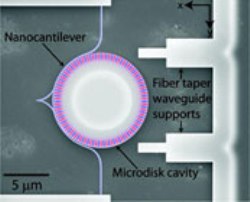CNST researchers have developed an innovative sensor that integrates a highly sensitive nanophotonic interferometer with a nanomechanical cantilever probe on a single silicon chip.
Details about the work were reported in Nano Letters. The development of the integrated sensor will eliminate the use of large laser detection systems and develop cantilevers of size smaller than those utilized in typical AFMs.
 Scanning electron micrograph of the cantilever-microdisksystem
Scanning electron micrograph of the cantilever-microdisksystem
The small structures, with mass below 1 pg, increase the detection bandwidth significantly and lower the response time of systems to a few 100 ns. To sustain high mechanical gain, the stiffness factor of the probe was maintained as in conventional microcantilevers. The probe size was lowered to a mere 260 nm in depth, 25 µm in length and 65 nm in width.
The probe was developed near a microdisk optical cavity within a distance of less than 100 nm. Owing to the proximity, movement of the probe tip is affected by the light traveling within the cavity. The cavity features a high optical quality factor (Q) which means that the light collects data about the position of the probe after repeated scanning of the cavity.
The sensitivity to probe movement will be below 1 fm/√Hz as a result of high Q and tiny probe-cavity separation. Under high bandwidth, the cavity will be capable of detecting changes in probe position. The device, nanofabricated on a silicon wafer as a single monolithic element, is small, self-aligned, and rigid.
Fiberoptic waveguides guide light to and from the sensor to enable easy interface with standard optical detectors and sources. Small variations in the geometry of the probe will affect the probe tip’s mechanics. These simple variations in probe geometry provide users various combinations of bandwidth and mechanical gain required for different AFM applications.